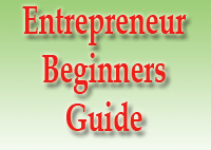Entrepreneur Beginners Guide
“You’re in Sales, whether you Want to be or Not”
Timid salesmen have skinny kids. —Zig Ziglar, author, motivational speaker
Reality hit us like a Mack truck and stopped us dead in our tracks. Although we reached our goal of creating OmniPublisher, one of the first content management systems built specifically for news-papers and other periodicals, we realized that we forgot to include the most important element in our plan to make millions. Like so many other naïve but brilliant computer programmers, we focused on building the product, not selling it. When the first version of OmniPublisher was complete, we looked at each other and said, “Now what?” You’d expect more from a guy who would go on to write code for Goldman Sachs’s trading division and a guy who was starting his third business, but you’ll find that this is a common scenario among young entrepreneurs.
Entrepreneurs who start a business without thinking of how their products or services will be sold in the marketplace are making a huge mistake. Why?
First, they run a high risk of wasting valuable resources to create a product or service that consumers do not want. We are all familiar with huge flops. Some of my favorites and most egregious include Webvan, a 2001 dotcom, that delivered groceries to your home. The company reached almost $1 billion in total investment before it shut down. More recently, Netflix announced that it would be separating its online streaming service and its DVD mail service. Bad idea. Not only did customers reject this, but they also viciously attacked the company for implementing the change. The move cost Netflix 800,000 customers.
Second, you are in business to make money. That’s the goal. As obvious as it sounds, some entrepreneurs forget this until it’s too late. They realize it when they arc too much in debt, when they have no operating income, or when they face some other cold-water-in-the-face moment. I remind myself every morning to focus on sales and profits. I think the title of George Cloutier’s book put it best: Profits Aren’t Everything, They’re the Only Thing.
Companies that focus on sales and customer needs from the very beginning are more likely to be big winners. For instance, without Steve Jobs’s talents in marketing and sales, Apple wouldn’t have grown to be a public company with record sales. Steve Wozniak, who certainly was the technical brain behind the Apple I personal computer, wanted to give away his inventions. Jobs, on the other hand, was adamant about selling the Apple I and other products at a premium price. The rest is history. Similarly, Mark Zuckerberg had Eduardo Saverin, who began selling advertising for Facebook in April 2004. These ads included moving companies, T-shirt retailers, and other companies that sold college-related products and services.
Of course, there are rare exceptions. For example, Twitter was born out of a brainstorming session in 2006. The project didn’t focus on sales and had no monetization strategy for years. Instead, the company honed in on developing the product and its user base. Also, Pandora took almost ten years to become profitable. These are great success stories, but most of us don’t have the luxury or willingness to wait that long. We must be profitable as soon as possible.
The wise entrepreneur makes sales, the lifeline of any business, priority number one. An entrepreneur who has no interest in sales finds the best sales experts for the team to ensure the business’s success. If you are like me, you sometimes focus too much on how great your product or service is. You assume that because it’s the best thing since sliced bread, everyone will buy it. It rarely works that way, and finding out the hard way is too expensive.
By the way, if you were wondering, my business partner and I decided that I would market OttaniPublisher to companies. Our decision was a huge mistake and stunted our growth. With the right sales talent and strategy, the value of the company would have been exponentially greater. I eventually sold the company, but for less than its full potential. It was a hard lesson to learn: If you build it, they do not necessarily come.

